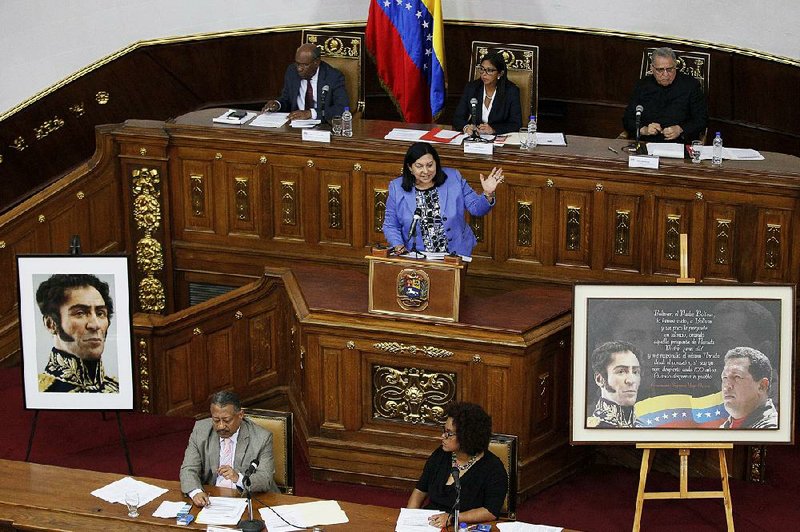CARACAS, Venezuela -- Venezuela's new constitutional assembly took over the halls of the opposition-controlled congress on Tuesday, issuing a decree declaring itself superior to all other branches of government and prominently displaying images of the late President Hugo Chavez.
The order bars anti-government lawmakers in the congress from taking any action that would interfere with the laws passed by the newly installed assembly, Delcy Rodriguez, the group's leader, declared to unanimous approval.
"We are not threatening anyone," said Aristobulo Isturiz, the constitutional assembly's first vice president. "We are looking for ways to coexist."
President Nicolas Maduro summoned the constitutional assembly in what he contends is an attempt to resolve the nation's political standoff, but opposition leaders insist it is a power grab. Since its installation Friday, the assembly has already ousted the nation's chief prosecutor, established a "truth commission" expected to target Maduro's foes and passed decrees pledging "support and solidarity" with the president.
The truth commission will function more as a tribunal than a venue that offers amnesty in return for healing testimony, the government has said. "The truth commission can try anyone," Maduro said this week.
In countries such as South Africa and Rwanda, such truth panels have allowed perpetrators of violence to confess their crimes in return for amnesty. The idea of those panels was to establish a base line of truth and extinguish deadly political passions. In Venezuela, forgiveness so far is not on offer.
"It's the truth of only one sector," said Carlos Berrizbeitia, an opposition lawmaker. "Surely they will use this to continue to persecute and threaten."
The newly empowered commission has existed in other forms for several years. After the failure of talks with the opposition last year, the government established a commission in the executive branch to investigate violence after a 2002 coup attempt. In May, Maduro widened its powers to investigate political attacks in 2017, most of them aimed at his government. Now, the commission will operate under the aegis of the new constitutional assembly with its untrammeled powers.
Diosdado Cabello, a political strongman, member of the new assembly and supporter of Maduro, said this week that the truth commission would be an instrument to advance the ruling party's goals.
"We're asking of the Justice and Truth Commission that anyone who has acted against the fatherland be stripped of public duties," he said, using the formal name of the commission.
Opposition lawmakers said Tuesday that they were barred from entering the gold-domed legislative palace after security forces led by Rodriguez broke into the congress late Monday.
"This government invades the spaces that it is not capable of legitimately winning," Stalin Gonzalez, an opposition lawmaker, wrote on Twitter of the assembly's takeover of the chamber the opposition has controlled since winning 2015 elections.
Earlier Tuesday, Venezuela's pro-government Supreme Court sentenced a Caracas-area mayor at the center of recent protests to 15 months in prison for not following an order to remove barricades set up during anti-government demonstrations.
Ramon Muchacho is the fourth opposition mayor whose arrest the high court has sought in the past two weeks. The court also ordered an investigation into another prominent Caracas-area mayor, David Smolansky, on the same accusations.
The constitutional assembly's meeting Tuesday came as criticism mounted from foreign governments that have refused to recognize the new body.
The foreign ministers of 17 Western Hemisphere nations met in Peru to discuss how to force Maduro to back down. Peru's president has been vocal in rejecting the new Venezuelan assembly, but the region has had trouble agreeing on collective actions.
The ministers issued a statement after the meeting condemning the constitutional assembly and reiterating previous calls for the parties in Venezuela to negotiate on ending the political crisis.
Meanwhile, leaders from the Bolivarian Alliance, a leftist coalition of 11 Latin American nations, met in Caracas and declared Venezuela's constitutional assembly a "sovereign act" aimed at helping the nation overcome its difficulties.
Venezuelan Foreign Minister Jorge Arreaza told representatives from nations including Cuba and Bolivia that long-standing U.S. aggressions against the South American nation have "entered a much stronger phase."
President Donald Trump's administration announced last week that it was freezing any U.S. assets Maduro might possess and barring any American from doing business with him in response to the July 30 election for delegates to the constitutional assembly.
The Bolivarian Alliance said in a statement read after the meeting, "We reiterate the call for a constructive and respectful dialogue."
Separately, only a few dozen demonstrators heeded the opposition's call to set up traffic-snarling roadblocks Tuesday in Caracas to show their opposition to the new assembly.
Protests that drew hundreds of thousands at their peak have drawn fewer people as fear and resignation creep in. At least 124 people have been killed and hundreds more injured or detained during the protests.
Information for this article was contributed by Joshua Goodman, Fabiola Sanchez and Christine Armario of The Associated Press and by Fabiola Zerpa, Andrew Rosati and Matthew Bristow of Bloomberg News.
A Section on 08/09/2017
